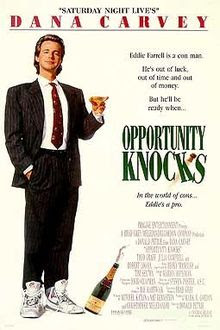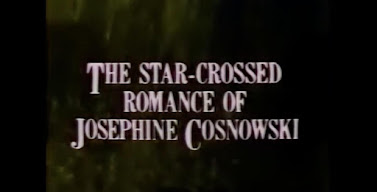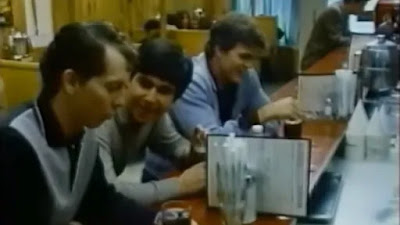Director
Charlie Chaplin
Cast
Charlie Chaplin - King Shahdov
Dawn Addams - Ann Kay
Oliver Johnston - Ambassador Jaume
Michael Chaplin - Rupert Macabee
Former New York Times film critic Eugene Archer said in his review of Charlie Chaplin's 1957 film A King in New York, "The works of genius are frequently difficult to understand, and the films of Charles Chaplin, operating simultaneously on several levels of meaning, present a critical problem of particular complexity."
Former New York Times film critic Eugene Archer said in his review of Charlie Chaplin's 1957 film A King in New York, "The works of genius are frequently difficult to understand, and the films of Charles Chaplin, operating simultaneously on several levels of meaning, present a critical problem of particular complexity."
For me, this film is a mess of cynicism, satire, frustration, let down and commentary on the social garishness and political obsessions of the U.S. during the 1950s from a jilted comedian.
I wanted to review a Charlie Chaplin film on this blog for sometime, but I couldn't narrow my options down to one.
As a long time admirer of Charlie Chaplin, and I still am, from his first screen appearance in Making a Living (1914) to his later films, The Great Dictator (1941), Monsieur Verdoux (1947), and Limelight (1952), A King in New York is a movie I wanted to see for years, but simply hadn't.
I stumbled upon it on HBO Max recently, and figured it was as good an opportunity as any to finally sit and watch it.
Known for his iconic character, "The Little Tramp," Chaplin was a genius when it comes to story telling. I immensely admire his films City Lights (1931) and Modern Times (1936) particularly. With the latter, I look past the tinge of Marxist overtones to appreciate and admire the innocent, ingenious comedy and romance within.
Chaplin wrote, produced, directed, and scored many of his movies, including this one.
These two silent movies were made after the advent of talking movies. As Chaplin felt sound would be a passing fad, these films prove he could tell a story with comedy, tragedy, and romance without having to speak.
But even Chaplin had to keep up with modern times, though he was reluctant to have the Little Tramp speak.
He eventually did, however, in his first full talking film The Great Dictator where he played dual roles. First, he played the Little Tramp for the last time in the role of Jewish barber. Chaplin also played a satirical version of Adolf Hitler. Hence, the movie's title.
Chaplin was exiled from the United States in 1952. By this time, his innocent "Little Tramp" character, loved by millions worldwide, was involved in a paternity suit. The public began to see an actor straying far from the innocent Tramp to a person who chased young girls and seemed irresponsible.
Above this, his loyalties were in question as this was a time when anti-Communism was at its zenith in America.
Chaplin opposed the House Un-American Activities Commission as they questioned many notable individuals about their loyalties towards Communism. Attorney General James McGranery didn't take kindly to his opposition and said Chaplin would only be granted a Visa if he could "prove his worth and right to reenter the U.S."
While sailing to his home country of England, the U.S. Government decided to deny Chaplin re-entry.
He ended up residing in Switzerland for the remainder of his years, but did return to the United States in 1972 to receive an Honorary Oscar. Chaplin received a deserved standing ovation that lasted 12 minutes during that ceremony.
Filmed in the U.K., A King in New York is his first after his exile, and wasn't released in the U.S. until 1972.
In A King in New York, Chaplin plays King Igor Shahdov who flees from his country of Estrovia to New York City after he's deposed from his throne following a revolution.
Once in New York City, the king wants to experience the American way of life. He moves into an upscale hotel room where his Ambassador, Jaume (Oliver Johnston), becomes his personal assistant.
His money situation is meager as his former Prime Minister stole his funds.
Shahdov tries contacting the Atomic Energy Commission with plans for using atomic energy for the sake of creating a utopia.
All the while, the king realizes he can't keep up with the fast paced raucous life in the Big Apple.
Several producers approach him to film commercials for various products, and are willing to pay him handsomely.
He's also invited to a dinner party, but declines the offer until he runs into a gorgeous woman named Ann Kay who's using a shared bathroom between their rooms.
 |
| Charlie Chaplin as King Shahdov in A King in New York |
Little does he know the party is a secretly televised program set up by Kay.
Shahdov learns this after the fact and is less than pleased knowing he was tricked to appear on television.
Still, Kay encourages him to accept television offers, and do whatever he can to look good on American T.V., including a little plastic surgery.
With funds depleted, Shahdov agrees to do a few commercials for payment.
He's also invited to speak at a progressive boy's school where he meets a 10-year old named Rupert Macabee (played by Chaplin's son, Michael Chaplin), whose mind is wrapped in more political thought than a child's mind should be.
Macabee lectures Shahdov about freedom and rule in a rather Marxist style.
The king learns the boy's parents are both Communists jailed for not giving names during a hearing similar to the McCarthy hearings held during this decade.
Later on, Shahdov finds Macabee aimlessly wondering the snowy streets of the city.
The kid ended up running away from his school. So, Shahdov takes him up to his room to give the boy food and shelter.
The king has to step out for a few hours, leaving Macabee behind.
While he's gone, some officials come to the king's room and Macabee lets them in.
He tells the officials that Shahdov is his uncle. They grow shocked as soon as this kid starts proselytizing his Marxist ideas. The press catches on to Shahdov affiliating with Macabee, and the king is soon suspected of being Communist himself.
So, Shahdov has to face hearings in front of a panel similar to the real House Committee of Un-American Activities.
As all this is going on, authorities make Macabee reveal the names that his parents wouldn't tell.
He's presented to the king afterwards to demonstrate what a patriot looks like, but the kid feels heavy with guilt.
Shahdov invites Macabee and his parents to travel to Europe with him.
"The madness won't go on forever," the king tells a weeping Macabee. "There's no reason for despair."
To those unfamiliar with Chaplin's life, A King in New York may come across as as a mere cynical picture, convoluted at times, running long at other times, and with a few funny bits here and there.
It's irksome to watch Chaplin, "the king," lecture American leadership about freedom while sympathizing for those adhering to a system that doesn't tolerate opposition in thought and deed - ideas that ultimately oppose freedom.
In a recorded interview in 2013 Michael Chaplin says there was no proof his father had any ties with Communists or the Communist party. I'm not claiming anything contrary.
In this movie, Chaplin tries to show American leadership the American optimism surrounding freedom and liberty which he, it seems, thinks the HUAC doesn't share.
The political aspect of this movie comes out when the king visits the progressive boy's school.
 |
| Michael Chaplin as Rupert Macabee |
"Surely you're not a Communist," the king replies.
"Do I have to be a Communist to read Karl Marx?"
"That's a valid answer," Shahdov says. "Well, if you're not a Communist, what are you?"
"Nothing. I dislike all forms of government."
"Well, somebody must rule."
Macabee says he doesn't like the word "rule" and begins a tirade about "human dignity destroyed by political power" because it antagonizes the people, and violates their "natural rights."
He uses the concept of passport regulations to prove his point, wagging his finger with each declaration while speaking mechanically without letting the king get a word in edgewise. The king practically begs him to let him talk.
"And free speech, does that exist?" Macabee asks.
"No, you've got it all!"
I don't know what to make of this scene as there's a lot happening here.
I don't know what to make of this scene as there's a lot happening here.
The encounter is mixed with some slapstick humor as other students play small pranks on Shahdov as he's engaging with Macabee. The entire scene concludes with Shahdov sitting on a cake.
Nothing Macabee dictates really moves the king.
But when we meet Macabee again, he's a hungry pitiful boy stranded out in the freezing cold. And the king then takes sympathy on him.
Macabee later identifies as a Communist because, as he claims, society makes it advantageous not to be one.
Shahdov later calls Macabee, "the most obnoxious child I ever met, but a genius."
Archer was on to something when he wrote that Chaplin operates simultaneously on several levels of meaning. Complexity indeed!
Based on how the scene plays out, I'm left thinking it's a depiction of where Chaplin stands in the midst of the political climate of his day.
He's not persuaded by Communism but still pities those who are Communist and have been questioned by the HCUA. Chaplin was a self-described humanitarian, and this sentiment of his popped up before in the speech he gave in The Great Dictator.
Nevertheless, the satire in the movie's depiction of American life is played out well in this movie. It's where the movie shines the most. Americans of the day were already riled up dancing in the aisles of rock concerts, mesmerized by the glare of movie screens, instantly sold by advertisements, and constantly surrounded by noise of music, media, traffic, and constant chatter. Nothing has changed much since then.
As far as the story goes, the movie is all over the place, tripping over itself with a drawn out narrative mixed with political commentary, satire, and a taste of silly humor.
By the third act, A King in New York slows down. The satire is used up in the previous acts. The story begins turning convoluted and long winded. The motivation just feels forced as though Chaplin is chastising the American system of the day, swatting it on the nose with a rolled up newspaper because the system booted him out.
No doubt Chaplin had a lot to say after being kicked out of the nation that helped make him the cultural icon he is to this day. His work is still loved and admired here and abroad.
Fans of Chaplin who take an interest in his life and work are more likely to appreciate this film rather than those who simply aren't interested.
 |
| Chaplin and Dawn Addams (right) |
It's not the first time in his career Chaplin used American officials as the punch line of his humor and satire.
In his 1917 silent movie The Immigrant, Chaplin kicks a rather pushy immigration officer up the backside. A foreigner making a mockery of the American governmental system wasn't taken kindly back then.
I believe this early scene was later used as evidence to "prove" Chaplin was "anti-American." I am willing to bet all my Chaplin movies that Charlie was anything but anti-American. Far from it.
It was a time though, after all, when American patriotism was high, as it should be. And anti-American sentiment within US borders needed and still needs to be swiftly expelled without a second thought.
But Chaplin's comedy works in his facial expressions which made me laugh. In the dinner party scene, while he sits next to Kay at the table and flirts with her, she randomly breaks into advertising slogans.
Shadhov has a confused look on his face as he glances around behind a smiling Kay who's looking towards the camera Shahdhov can't see.
I still maintain my love and appreciation for Chaplin as an artist. I love satire, but Charlie's satire in this movie is clearly coming from bitterness. Some of is a sort of "a funny thing happened on the way to the House Un-American Activities Commission" scenario. Other times, it's the same kind of humor a jilted boyfriend would make about the girlfriend who dumped him.
My displeasure is where Chaplin depicts his preachy toleration. You can't tolerate everything, even in the name of "humanity." We should respect people. We shouldn't respect nor tolerate their bad ideas.
This is a movie made from the mind and view of a jilted man, broken over a major rejection after a relationship between himself and the United States that lasted several decades.
To put it in modern terminology, the HCUA in the 1950s was simply trying to cancel Communists because Americans generally don't like people trying to overturn American culture.
While Chaplin seems to support even Communist thought to flow freely like all other thoughts, I have to side with G.K. Chesterton on this one who says "there's a thought that stops thought. That is the only thought that ought to be stopped."
While Chaplin seems to support even Communist thought to flow freely like all other thoughts, I have to side with G.K. Chesterton on this one who says "there's a thought that stops thought. That is the only thought that ought to be stopped."




















